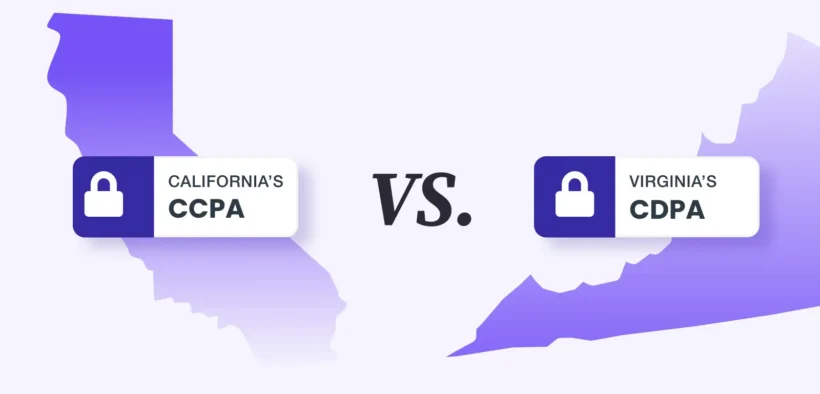Virginia vs. California Privacy Laws: The Key Differences That Could Cost Your Business
Share

Virginia Consumer Data Protection Act vs. CCPA: Key Differences for US Companies
As the United States edges closer to a patchwork of state-level privacy laws, businesses must pay close attention to how rules differ from one state to another. The Virginia Consumer Data Protection Act (VCDPA) and the California Consumer Privacy Act (CCPA) are two of the most important frameworks shaping how companies handle consumer data in 2025.
While both laws give consumers more control over their personal data, they are not identical. For U.S. companies, understanding these differences is critical to avoiding compliance pitfalls, fines, and reputational risks.
Quick Overview of VCDPA and CCPA
| Feature | VCDPA (Virginia) | CCPA (California) |
|---|---|---|
| Effective Date | January 1, 2023 | January 1, 2020 (amended by CPRA, 2023) |
| Applicability Threshold | 100,000 consumers annually (or 25,000 if >50% revenue from data sales) | $25M annual revenue OR 100,000 consumers/households OR 50% revenue from data sales |
| Consumer Rights | Access, correction, deletion, portability, opt-out | Access, correction, deletion, portability, opt-out, limit use of sensitive data |
| Enforcement | Virginia Attorney General only | California Privacy Protection Agency (CPPA) + Attorney General |
| Private Right of Action | None | Limited (data breaches only) |
| Sensitive Data | Requires opt-in for processing | Consumers can opt-out of use/sharing |
| Cure Period | 30 days | Removed under CPRA (no cure period) |
Key Differences That US Companies Must Know
1. Scope and Applicability
The VCDPA applies mainly to businesses operating in Virginia or targeting Virginia residents, with thresholds tied to consumer data volume and revenue from sales.
The CCPA, especially after its CPRA amendments, casts a wider net, covering both large businesses ($25M+ revenue) and companies heavily engaged in consumer data sharing.
Takeaway: Even mid-sized businesses may be caught under CCPA rules, while VCDPA is more forgiving unless data sales are central to your business model.
2. Consumer Rights Granted
Both laws grant rights of access, correction, deletion, and portability. However:
- Under CCPA/CPRA, consumers can limit the use of sensitive personal information and opt-out of “sharing” for targeted advertising.
- Under VCDPA, businesses must obtain opt-in consent before processing sensitive data such as health information, race, religious beliefs, or precise geolocation.
Example: A fitness app collecting health metrics in Virginia must ask for explicit consent, while in California it must offer an opt-out.
3. Enforcement and Penalties
- VCDPA: Enforced only by the Virginia Attorney General. Penalties can reach up to $7,500 per violation, but companies get a 30-day cure period to fix issues.
- CCPA/CPRA: Enforced by both the California Attorney General and the California Privacy Protection Agency (CPPA). There is no cure period, and fines can be significant—$2,500 per violation or $7,500 for intentional violations, including misuse of children’s data.
Takeaway: California takes a tougher stance, both in regulatory oversight and in eliminating the grace period for violations.
4. Private Right of Action
- CCPA/CPRA allows consumers to sue businesses for data breaches involving personal information.
- VCDPA does not provide consumers with this right.
This makes litigation risks higher in California than in Virginia.
5. Treatment of Sensitive Data
Sensitive data rules are stricter under VCDPA. Businesses must seek opt-in consent to process sensitive categories, whereas CCPA/CPRA lets consumers opt-out of their use.
This difference means companies may need to design dual compliance flows depending on whether data subjects are from Virginia or California.
Compliance Challenges for US Businesses
- Multi-State Patchwork
Companies serving customers nationwide must manage different state requirements simultaneously. - Data Mapping Complexity
To comply, businesses need to know which state’s consumers they’re collecting data from and apply the right rule. - Operational Adjustments
Consent mechanisms, opt-out links, and privacy notices may need tailoring for different jurisdictions.
Practical Compliance Tips for Companies
- Conduct a data inventory to identify where consumer data is coming from.
- Update privacy notices to reflect both VCDPA and CCPA requirements.
- Implement consent management tools that allow flexible opt-in/opt-out options.
- Train staff to handle consumer requests appropriately depending on the state.
- Monitor legislative updates since more states (like Colorado, Connecticut, and Utah) have also passed privacy laws.
FAQs: VCDPA vs. CCPA
Q1: Do both laws apply if my business operates online nationwide?
Yes, if you meet the thresholds and collect data from both Californians and Virginians, you must comply with both.
Q2: Which law is stricter—VCDPA or CCPA?
The CCPA (with CPRA updates) is generally stricter, especially around enforcement and penalties. VCDPA is stricter only in requiring opt-in for sensitive data.
Q3: Do small businesses need to worry?
If your business is under the thresholds, you may not be covered. However, adopting privacy best practices early is smart for building consumer trust.
Q4: Will there be a federal privacy law soon?
Discussions are ongoing, but for now, companies must manage compliance on a state-by-state basis.
Final Thoughts
The Virginia Consumer Data Protection Act (VCDPA) and the California Consumer Privacy Act (CCPA) represent two of the strongest state-level privacy laws in the U.S., but their differences create compliance challenges for businesses.
For companies handling consumer data across multiple states, the smartest strategy is to adopt the strictest standard across the board. This not only reduces compliance risk but also demonstrates a commitment to data ethics and consumer trust.




































Leave a Reply